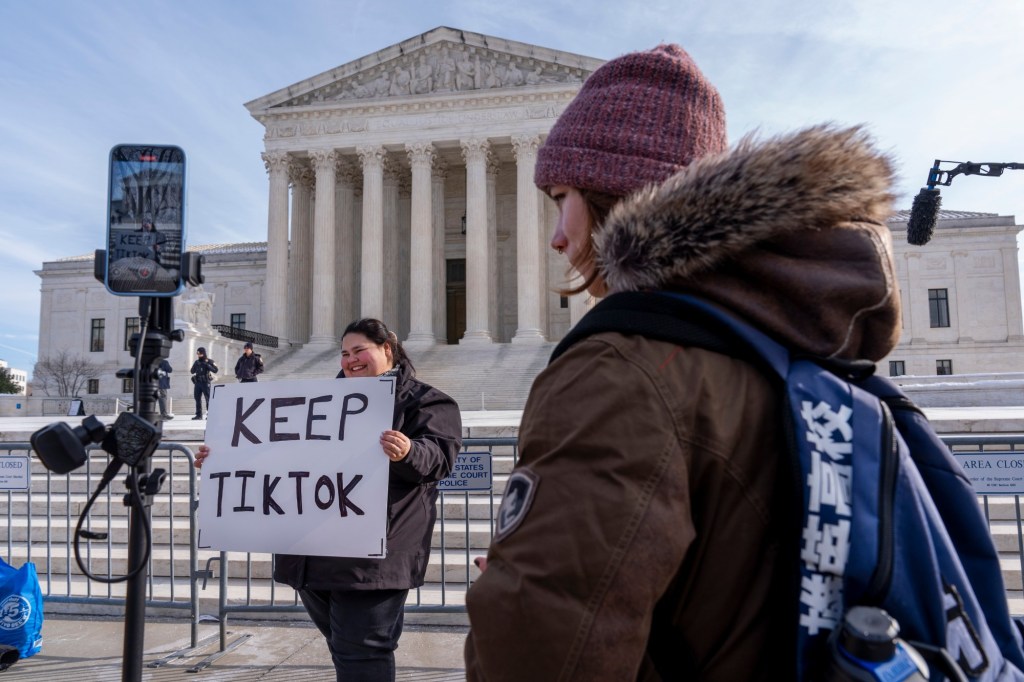
DeepSeek, a less expensive, more efficient Chinese AI alternative to ChatGPT was unveiled recently, briefly wiping out more than a trillion in value from the US stock market. The reason behind the panic? DeepSeek was allegedly created with far less computing power than America’s leading AI, punching a hole in the American tech industry’s highly expensive approach.
What’s concerning is that DeepSeek doesn’t hide that it collects large swaths of data on its users. It openly collects data, including user keystrokes and personal information and “secures” it in data centers in China, making it feasibly at the behest of the Chinese government.
President Donald Trump called DeepSeek a “wake up call that [the US] needs to be laser focused on competing to win.” However DeepSeek emerged while American politicians misguidedly focused their ire on another tech company, ByteDance.
On January 19, in accordance with the Foreign Adversary Controlled Applications Act, a ban on TikTok and other ByteDance applications went into effect in the United States. TikTok, and other ByteDance applications including Capcut, went dark for several hours until President Donald Trump offered assurances to the company that he would sign an executive order to temporarily halt the ban. While TikTok can be used in the United States, it’s unclear for how long it will remain available unless ByteDance divests from China.
It seems that Washington doesn’t understand the true reason why the prospect of a TikTok ban is causing hysteria. It is not just teenagers scrolling for hours on end who lost a self-expression platform. Millions of Americans risk losing their entire livelihoods—there are over 7 million businesses on TikTok. It’s important to note that these businesses are run by average Americans, many of whom have foregone a traditional 9-5 career to bring communities together by sharing compelling or educational videos with their audiences. Many of these companies may not receive direct compensation from TikTok but have monetized their platforms to be lucrative in other ways, such as by partnering with companies or providing commissionable links. Shutting the lights on TikTok, alongside these legitimate businesses that have done nothing wrong, only serves to cripple the American economy and dampen the entrepreneurial spirit that makes America great.
China hawks originally banned the app due to concerns that the Chinese government may compel ByteDance to access millions of Americans’ data.
TikTok does not operate in China. However, ByteDance’s subsidiary Douyin operates solely in mainland China. Like TikTok, Douyin is also an app, but is separate from TikTok.
After a Committee on Foreign Investment in the United States review, TikTok moved all US user data from its servers in Singapore and Virginia to Oracle servers based in the United States, putting the data under domestic US law. TikTok also created a data security team to gatekeep U.S. user information and “ringfence” it from the rest of ByteDance. TikTok also claims that employees of Douyin are restricted from access to TikTok’s U.S. user databases. However, it’s unclear if these claims are true, since a 2022 report alleged that ByteDance developers in mainland China at one time had access to American data.
This hysteria in the national security community has only heightened due to speculation that the Chinese government has a “golden share” of ByteDance that may allow it to veto certain decisions made by the company. If that is indeed the case, President Trump may need to directly negotiate with the Chinese government to ensure that TikTok remains operational in the United States, which is not necessarily a bad thing. Negotiations directly between the two governments could open doors to other forms of cooperation that are mutually beneficial.
However, ByteDance and TikTok have repeatedly explained that the Chinese government does not have a “golden share” of the companies. ByteDance’s board of directors is composed of five individuals, none of whom are part of a state entity. Three are Americans.
It also doesn’t seem that Washington fully understood where TikTok’s users would go. During the few hours that TikTok went down, Americans flocked to a Chinese social media app, RedNote, making it the number one most downloaded app in the United States. Unlike TikTok, RedNote stores its data entirely in China. RedNote is entirely based in China and its algorithms are subject to China’s strict content moderation requirements.
Instead of moving forward with a ban, members of Congress could have pursued other policy options. Leaders should confirm the veracity of TikTok’s claims and provide more evidence of specific harm. If they do not find specific instances of harm, Congress should pass a bill like the one introduced by Senator Rand Paul (R-KY) and Representative Ro Khanna (D-CA-17) that would repeal the TikTok ban. It’s not too late to amend the law so that the lights stay on for TikTok and the growing number of businesses that rely on its platform.
What’s clear is that by attacking TikTok, more egregious Chinese innovations like DeepSeek and RedNote, filled the gap. Rather than pursuing a quixotic whack-a-mole approach to foreign tech companies, politicians should investigate the reason why American companies are lagging behind in the tech sector, and foster an environment where competition is allowed, which will encourage American innovation. US national security will benefit from a competitive and innovative tech environment.
Demri Scott Greggo is a Contributing Fellow at Defense Priorities.



